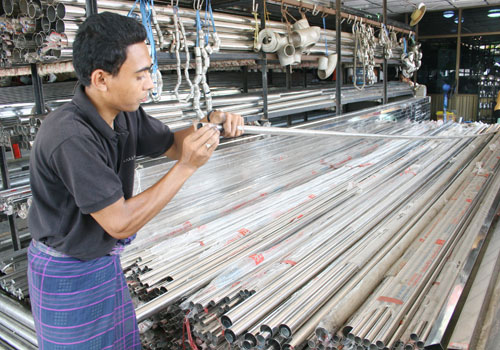Myanmar: SMEs squeezed with little government support
After the new NLD-led government came into office, supporting small and medium enterprises (SMEs) was included in the 12-point economic policy released by the administration last year. A year has passed but little has changed for those enterprises so far.
In its long-awaited economic policy presented on July 29, the government highlighted the importance of developing a market-oriented system “in all sectors”, establishing an economic framework in support of national reconciliation and providing assistance to SMEs, which would as a result create employment opportunities and develop the national economy.
SMEs play a major role in the development of a nation, and although the government accepts that they are vital for job opportunities and economic development, there was no effective assistance to the sector during the first year of office.
SMEs have been struggling to survive throughout successive governments and it still continues to struggle these days. Businessmen involved in SMEs have pointed out that red-tape hasn’t been eradicated yet.
“What I see is that SMEs face more difficulties … We found it difficult during President U Thein Sein’s term as well. Now, nothing has changed … The government doesn’t have clear-cut policies …They can’t even relax [improve] the issue of red-tape under the previous government. The SME sector suffers the most,” said SME businessman U Soe Myint.
According to those businesses, the SMEs have to seek approvals from several departments for a license and restrictions on operations are worse than before. The government does not dare to carry out what should have been done.
Production costs including transport costs are high in Myanmar compared to other neighbouring countries in which taxis and trucks use natural gas. In contrast, Myanmar still uses expensive diesel and gasoline. If the competitiveness of SMEs can be enhanced, they can compete against foreign competitors. The high cost of domestic production has been a problem since the previous government, the businesses added.
During the governmental transition period – as there isn’t a strong bureaucracy and the government has to prioritise other important sectors – they cannot take great care of the SME sector, said Dr Maung Maung Lay, vice chair of the Union of Myanmar Federation of Chambers of Commerce and Industry (UMFCCI).
“There are some banks for SMEs and SMEs need financial support. Loans can’t be extended without using collateral. Those who don’t have homes or lands need capital … They need financial support services but Myanmar doesn’t [offer adequate support] …
“We have to struggle a lot and the development hasn’t met its potential, we need comprehensive support for the development. SME’s main lifeline is financial assistance. Without financing, there will be no technology. SMEs are still under great expectations,” he explained.
During the new government’s first year of office, trade and investment haven’t increased as much as expected and economic growth has slowed down. Myanmar’s economy will be progress if SMEs – constituting 97 percent of the industry – are able to grow and flourish.
There are Japanese loans and financial assistances for some domestic banks to the SME sector but the state budget allocation has almost nothing for the SMEs.
“Assistance is given in terms of policy and laws in cooperation with international agencies. It is very rare to use the state’s budget. Some joint-operations, along with international organisations, were cancelled after a last-minute policy change.
“We have to rely on the resources from others and the policies of other people [organisations or countries], because we can’t stand on our own,” said Daw Aye Aye Win, director general of the Ministry of Industry, SME Development Department.
According to statistics in some countries, SMEs constitute 33pc of a nation’s GDP and the enterprises support job creation. In developing countries, the SME sector is responsible for 50-70pc of job creation. In Myanmar, SME development is in need of finance, technological expertise and a sound business environment.
“The SME sector is not quite satisfactory in Myanmar. Loans through collateral make it difficult for SME entrepreneurs to have access to funding. Bank loans should be extended to the SME sector,” said Dr Maung Maung Thein, committee member of SME Development Central.
Source: http://www.mmtimes.com/index.php/business/25574-smes-squeezed-with-little-government-support.html


 Thailand
Thailand




